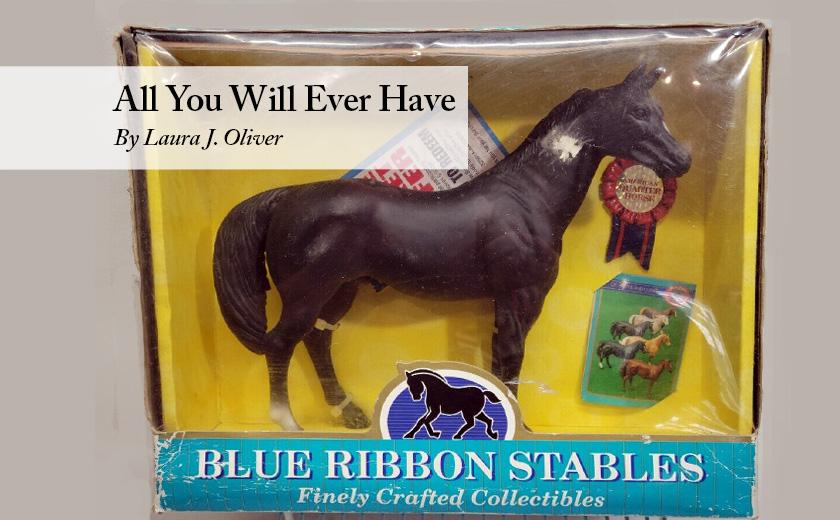One of my older sisters and I look a great deal alike. When we were little, our mother sometimes dressed us in matching outfits– plaid dresses and coordinated playsuits– as if we’d be more appealing as twins. But the similarities are superficial. My mantras tend to be, “close enough,” “good enough,” and “who will know?” My sister is a perfectionist, saves everything, and is flawlessly organized.
I was visiting this sister on her Charlottesville farm when I opened a storage closet and discovered the entire set of plastic horses she received for Christmas when we were 4 and 9. The shiny black stallion reared on his molded back legs, his little chain reins still attached. The creamy palomino still wore his tiny saddle, perfectly intact. And I thought,
This is just wrong. So wrong.
I always return from these visits equally inspired to organize my closets and demoralized because I just don’t care enough to keep them that way past Wednesday. And my childhood toys—Scottie Dog, my Ginny doll—disappeared years ago. I swear they were stolen. I suspect it was an organized crime. I had a bride doll for a long, long time, (yes, a bride doll), and I was proud of that fact, but then I found a box turtle, put him in her case and ruined that real estate.
I asked my sister about her need to hang onto things so long that their value is primarily their longevity. She said, “I think I’m afraid that what we have today is all we’ll ever have—that we have to make what we have last forever.” Which is interesting because it actually means her perfectionism and thriftiness, which I both judge and greatly admire, are sourced in fear.
As she aged, our mother also thought odd things were nonrenewable resources: like vision. She thought she was going to “use up” her eyes if she watched television. She thought she would run out of sight, the way you might run out of gas. As her sight dimmed, she viewed what remained like a Honda with 200,000 miles on it. Just keep that thing in the garage. Emergency use only!
I told her repeatedly that vision is like your heart—the more you use it the stronger it gets. I claimed to be quoting her doctor. I used his name and spoke with an authority I didn’t have, and she didn’t believe. I would have done anything to have lifted the weight of her perpetual anxiety.
I look out across the wildflower fields of my sister’s farm to the immaculate stables on the rise above the lake. “You own real horses now. You ride your black stallion and creamy palomino every day.”
Back at home in my old stucco four-square, I feel lazy as I stuff a drawer closed on my sweaters without properly folding, buy a new blender rather than searching out a 10-year warranty and ordering parts.
I’m only marginally invested in saving possessions because I have a feeling the things around us are as insubstantial as stage props, no more real than the façade of Main Street in a Western film. What appears as mass, is in reality, only energy. In the blink of an eye, all that you own, all you protect, all that looks real, could be gone. Will be gone. Nothing lasts no matter what you do.
Except this: Children well loved, will go on to love well. People you cared for, will care deeply for others. Those you made laugh will pass on that joy, long after this world has forgotten your name.
Laura J. Oliver is an award-winning developmental book editor and writing coach, who has taught writing at the University of Maryland and St. John’s College. She is the author of The Story Within (Penguin Random House). Co-creator of The Writing Intensive at St. John’s College, she is the recipient of a Maryland State Arts Council Individual Artist Award in Fiction, an Anne Arundel County Arts Council Literary Arts Award winner, a two-time Glimmer Train Short Fiction finalist, and her work has been nominated for a Pushcart Prize. Her website can be found here.

